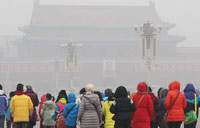BEIJING -- For Meng Lanzhi, founder of Hebei Tianzhu Iron and Steel (Group) Co. Ltd., smog is not just a health risk. It's also bad for business.
"If smog reaches a serious level and the government initiates an emergency response, my plant has to cut half its production capacity," said Meng, 65, a farmer-turned-businesswoman and also a deputy to the National People's Congress (NPC), China's top legislature.
"That means we have to produce 5,000 tonnes less steel every day," said Meng, board chairwoman of the private steel manufacturer with 6,200 staff based in the port city of Tangshan in North China's Hebei province.
 |
 |
Premier Li Keqiang on Wednesday described smog as "nature's red-light warning against the model of inefficient and blind development," and said China will "declare war" on pollution.
Three decades of rapid industrialization and urbanization have brought wealth to millions of people like Meng in China. But the development has also caused severe environmental consequences such as smog, which in turn affects Chinese businesses.
Meng's business currently only makes minimal profits because the price of steel has dropped due to overcapacity and sluggish demand. Yet she spent 100 million yuan ($16.3 million) last year on sewage treatment to meet the environmental standard set up by the municipal government.
What's more, she is expected to invest another 200 million yuan to install equipment for coal gas reclaiming, dust cleaning and steam power generation to meet the government's tough standards on pollutant discharge.
Tangshan plans to reduce the density of PM2.5, a key indicator of air pollution, by about 33 percent from 2012 levels by the year 2017. It also plans to cut iron production capacity by 28 million tonnes and steel production capacity by 40 million tonnes, also by 2017.
On the national scale, China plans to cut steel production capacity by 80 million tonnes by 2017, 75 percent of which lies in Hebei province.
So far, Meng has not received notification from the Tangshan municipal government to reduce capacity, but she already feels the pressure and has taken the initiative to improve her plant's discharge standards.
Environmental protection technologies for steel production are not mature in China, so Meng is perplexed about what kinds of equipment to procure.
Meng said environmental protection authorities should provide more information and services on equipment procurement in addition to their supervision efforts.
For smaller steel makers like Tangjia Iron and Steel Company, a private company with an annual production capacity of 1 million tonnes in Tangshan, the chances of survival are tougher.
